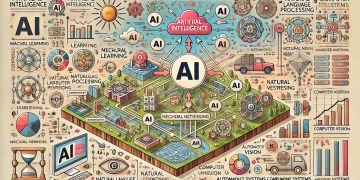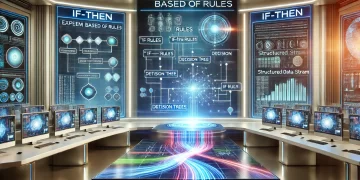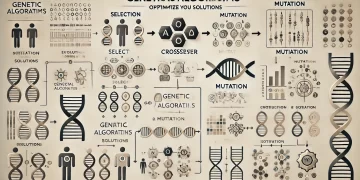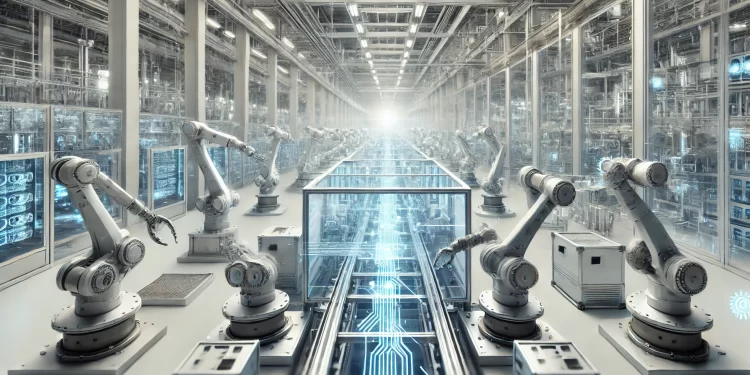Artificial Intelligence (AI) is playing a pivotal role in the evolution of robotics and automation, enhancing efficiency, precision, and adaptability across various industries. AI-powered robotic systems are revolutionizing manufacturing, healthcare, logistics, and service sectors by automating complex tasks, improving decision-making, and reducing human intervention. This article explores the diverse use cases of AI in robotics and automation and their impact on different industries.
1. AI in Industrial Automation
AI-driven robotics are transforming manufacturing by automating assembly lines, quality control, and predictive maintenance. Intelligent robots equipped with machine learning algorithms can identify defects, optimize production schedules, and improve operational efficiency. AI-powered cobots (collaborative robots) work alongside human workers, enhancing productivity and safety.
2. AI in Healthcare Robotics
AI-powered robots assist in surgeries, rehabilitation, and patient care. Surgical robots enhance precision in minimally invasive procedures, reducing recovery times. AI-driven exoskeletons aid patients with mobility impairments, while robotic nurses help with medication management and patient monitoring, improving healthcare efficiency.
3. AI in Logistics and Supply Chain Automation
Autonomous robots streamline warehouse management by automating inventory tracking, order fulfillment, and material handling. AI-driven drones facilitate faster deliveries and surveillance, while self-driving vehicles optimize transportation and logistics, reducing costs and delivery times.
4. AI in Autonomous Vehicles
AI is at the core of self-driving cars, enabling real-time decision-making for navigation, obstacle avoidance, and traffic management. AI-powered sensors and deep learning algorithms enhance road safety, fuel efficiency, and driving experience, paving the way for fully autonomous transportation.
5. AI in Smart Agriculture Robotics
AI-driven agricultural robots automate harvesting, planting, and crop monitoring. Machine vision systems assess plant health, optimize irrigation, and detect diseases, increasing yield and sustainability. AI-powered drones monitor large fields, ensuring efficient farming practices.
6. AI in Defense and Security Robotics
AI enhances defense systems through autonomous drones, surveillance robots, and robotic combat units. AI-driven robots assist in bomb disposal, reconnaissance missions, and border security, reducing risks for human personnel. Machine learning algorithms improve threat detection and response strategies.
7. AI in Service and Hospitality Robotics
AI-powered service robots assist in restaurants, hotels, and customer service. Chatbots and humanoid robots enhance guest experiences by providing information, taking orders, and delivering services. AI-driven automation improves efficiency in retail and entertainment sectors.
8. AI in Home Automation and Smart Robotics
AI-powered home automation systems use robotic assistants for cleaning, security, and entertainment. Smart home devices integrate AI-driven virtual assistants to control lighting, temperature, and appliances, creating a seamless living experience.
9. AI in Space Exploration Robotics
AI plays a crucial role in space exploration by powering autonomous rovers, robotic arms, and satellite navigation systems. AI-driven robots explore distant planets, analyze geological data, and assist astronauts in conducting experiments in space missions.
10. AI in Construction and Infrastructure Automation
AI-driven robotic systems automate construction tasks such as bricklaying, 3D printing of buildings, and infrastructure inspection. AI-powered drones monitor construction sites, ensuring safety and efficiency in large-scale projects.
Conclusion
AI is revolutionizing robotics and automation by enhancing precision, efficiency, and adaptability across various industries. From industrial manufacturing to healthcare, logistics, and space exploration, AI-powered robots are transforming how tasks are performed. As AI technology continues to advance, its integration into robotics will drive innovation, improve productivity, and shape the future of automation.
References
- Deloitte Insights. (2023). “AI in Industrial Automation: The Future of Smart Factories.”
- McKinsey & Company. (2023). “AI-Powered Robotics in Healthcare.”
- PwC. (2023). “Autonomous Vehicles and AI: Transforming Transportation.”
- Gartner. (2022). “AI and Robotics in Logistics and Supply Chain Management.”
- Forbes. (2023). “The Role of AI in Space Exploration Robotics.”
- Harvard Business Review. (2022). “AI-Driven Service Robots and Their Impact on Customer Experience.”




































